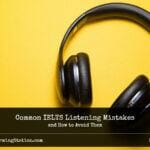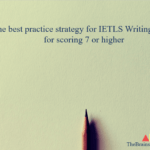Introduction
The International English Language Testing System (IELTS) is a widely recognized English proficiency exam taken by millions of people around the globe. With its emphasis on assessing a candidate’s ability to understand, communicate, and write effectively in English, the IELTS exam plays a crucial role in securing admissions to universities, obtaining visas, and advancing one’s professional career. The IELTS Writing section, in particular, is an essential component of the test, as it gauges your ability to express ideas clearly and coherently, while demonstrating a strong command of the language.
Given the significance of the IELTS Writing section, it is vital to be well-prepared and avoid common mistakes that can hinder your performance. This article aims to provide you with an overview of the most frequent IELTS Writing errors and equip you with practical strategies to overcome them. By understanding these pitfalls and implementing our expert tips, you will be well on your way to improving your IELTS Writing score and achieving the desired results.
Common IELTS Writing Mistakes
Inaccurate or Inappropriate Vocabulary
One of the most common mistakes in the IELTS Writing section is the use of inaccurate or inappropriate vocabulary. Some test-takers may resort to using complex words to impress the examiner, but without a proper understanding of their meanings or contexts, these words can often be misused. This can lead to confusion and can negatively impact your score.
Tips to Improve Vocabulary
- Read widely and regularly: To enhance your vocabulary, expose yourself to diverse reading materials, including newspapers, magazines, academic journals, and books. This will help you encounter new words, phrases, and expressions, improving your overall language proficiency.
- Maintain a vocabulary journal: Whenever you come across an unfamiliar word, note it down in a journal along with its definition, pronunciation, and an example sentence. Regularly reviewing these entries will reinforce your learning and enable you to use the new vocabulary more effectively.
- Use vocabulary in context: To consolidate your understanding, practice using new words and phrases in context by writing sentences, paragraphs, or even entire essays. This will help you become more comfortable with the new vocabulary, and you’ll be better equipped to use it appropriately in your IELTS writing.
Poor Grammar and Punctuation
Another frequent issue is poor grammar and punctuation. Errors in sentence structure, verb tense, subject-verb agreement, and the use of articles, prepositions, and punctuation marks can make your writing difficult to understand and diminish the overall quality of your work. Examiners are looking for clear and accurate language, so it’s crucial to minimize these mistakes.
Strategies for Better Grammar and Punctuation
- Review grammar rules and practice exercises: Regularly revisiting grammar rules and working through practice exercises will help you identify and rectify your weaknesses. This focused approach will lead to gradual improvement in your grammar and punctuation skills.
- Proofread and edit your work: Always take the time to proofread and edit your writing, checking for errors in grammar, punctuation, and sentence structure. This will not only help you avoid mistakes but also improve the overall clarity and coherence of your essay.
- Use grammar-checking tools: Make use of reliable grammar-checking software, like Grammarly or Microsoft Word’s built-in editor, to help you identify and correct errors. However, remember that these tools are not foolproof and should be used as a supplement to your own proofreading efforts.
Overgeneralization or Unsupported Claims
Many IELTS candidates fall into the trap of making overgeneralizations or unsupported claims in their writing. This can result from a lack of specific knowledge or an attempt to cover too many points within the limited word count. However, vague statements and unsupported arguments weaken your essay and can hurt your score.
Avoiding Overgeneralization and Unsupported Claims
- Use specific examples and evidence: To strengthen your arguments, provide concrete examples and evidence that support your claims. This will add credibility to your essay and demonstrate your critical thinking abilities.
- Be critical in your analysis: Instead of relying on generalizations or assumptions, analyze the topic critically and consider different perspectives. This will help you develop well-reasoned and balanced arguments.
- Avoid sweeping statements: Refrain from making broad statements without sufficient evidence or explanation. Instead, focus on precise and substantiated points that directly address the question.
Example 1
Incorrect: Technology has had a significant impact on the way people communicate.
Correct: Technology, such as smartphones and social media platforms, has revolutionized communication by enabling people to stay connected with friends and family around the world in real-time, regardless of geographical barriers.
Example 2
Incorrect: All children should learn a second language because it will make them smarter.
Correct: Learning a second language during childhood can have cognitive benefits, such as improved problem-solving skills and enhanced mental flexibility.
Incoherent Structure or Lack of Organization
A well-organized essay is key to achieving a high score in the IELTS Writing section. Test-takers who fail to plan their essays often end up with incoherent structures and disjointed paragraphs. This lack of organization makes it difficult for the examiner to follow your ideas and can significantly reduce your score.
Enhancing Structure and Organization
- Plan your essay before writing: Before you start writing, take a few minutes to outline your main points and organize them logically. This will help you create a coherent structure and ensure your essay flows smoothly from one idea to the next.
- Use clear topic sentences and logical transitions: Begin each paragraph with a clear topic sentence that outlines the main point of the paragraph. Use transition words and phrases to connect your ideas and guide the reader through your essay.
- Stick to a consistent format: Follow a consistent format for your essay, such as the standard introduction, body paragraphs, and conclusion structure. This will make it easier for the examiner to follow your ideas and understand your argument.
Not Answering the Question or Deviating from the Topic
Lastly, a common mistake is not fully addressing the question or deviating from the topic. Some candidates may misinterpret the prompt or focus too much on a specific aspect, neglecting other important points. This oversight can lead to a lower score, as examiners expect a comprehensive and relevant response to the given question.
Staying on Topic and Answering the Question
- Analyze the question thoroughly: Before writing, read the question carefully and ensure you understand what is being asked. Break it down into its key components and consider any specific requirements or limitations.
- Keep the question in mind while writing: As you write your essay, continually refer back to the question to ensure your points are relevant and address the prompt. This will help you stay focused and avoid deviating from the topic.
- Revise and ensure your essay answers the question: During the editing process, double-check that your essay addresses all aspects of the question and provides a comprehensive response. If necessary, make revisions to ensure your essay fully answers the prompt.
Failing to Address All Parts of the Question
In IELTS Writing Task 2, it is crucial to address all parts of the question to ensure a comprehensive and coherent response. A common mistake is neglecting one or more aspects of the prompt, which can result in an incomplete or off-topic essay.
How to avoid
To avoid this mistake, carefully analyze the question and identify all its components before starting your essay. Break down the prompt into smaller parts, and make sure that you address each aspect in your response. Use an outline or a plan to organize your ideas and ensure that all parts of the question are covered. Revisit the prompt during the proofreading stage to double-check that you have addressed all aspects of the question.
Overusing Complex Vocabulary
One common mistake in IELTS Writing Task 2 is overusing complex vocabulary in an attempt to impress the examiner. While it is important to showcase a wide range of vocabulary, using overly complicated words without a clear understanding of their meaning can lead to confusion and might not convey your message effectively.
How to avoid
To avoid this mistake, focus on using the appropriate vocabulary that accurately conveys your ideas. Expand your vocabulary through consistent reading and practice, ensuring that you understand the meaning, usage, and context of each new word. When using complex words, make sure they fit naturally within the context of your sentence and do not force their usage.
Example
Incorrect: The report delineates that the company’s financial asseverations are spurious, leading to a decline in investor confidence.
Correct: The report indicates that the company’s financial statements are false, leading to a decline in investor confidence.
Writing Irrelevant Content
Another common mistake in IELTS Writing Task 2 is writing irrelevant content that does not address the prompt directly. This can result from misinterpreting the question or trying to include as many points as possible without considering their relevance to the topic.
How to avoid
To avoid this mistake, analyze the question thoroughly and identify its key components. Ensure that your response directly addresses the prompt and stays on topic throughout. Plan your essay beforehand, outlining your main points and checking their relevance to the question. Remove any irrelevant information that does not contribute to answering the prompt.
Example
Question: Some people believe that it is more important to spend money on experiences, such as travel, than on material possessions. Do you agree or disagree?
Incorrect: Traveling allows people to learn about new cultures and languages, while material possessions can provide comfort and convenience. Some popular travel destinations include Paris, New York, and Tokyo.
Correct: Traveling allows people to learn about new cultures and languages, which can lead to personal growth and lasting memories. In contrast, material possessions often provide temporary satisfaction and can be replaced over time. Therefore, I agree that spending money on experiences is more important than material possessions.
Inadequate Paragraphing and Structure
A common mistake in IELTS Writing Task 2 is the lack of proper paragraphing and essay structure. This can lead to disorganized content, making it difficult for the examiner to follow your ideas and arguments.
How to avoid
To avoid this mistake, plan your essay before writing, ensuring that you have a clear introduction, body paragraphs, and a conclusion. Begin each paragraph with a topic sentence that summarizes the main idea, and use logical transitions to connect your ideas. Maintain a coherent and well-organized structure throughout your essay, which will make it easier for the examiner to understand your argument and award a higher score.
Example
Incorrect: Many people believe that learning a second language is essential for success in today’s globalized world. It can improve job prospects. Traveling to foreign countries is easier. It is also possible to enjoy movies, books, and other media in their original language.
Correct: Many people believe that learning a second language is essential for success in today’s globalized world. Firstly, it can improve job prospects, as bilingual employees are often in high demand and may have access to better career opportunities. Secondly, traveling to foreign countries becomes easier, as language proficiency allows for smoother communication with locals. Finally, being able to understand a second language enables individuals to enjoy movies, books, and other media in their original language, providing a richer cultural experience.
Insufficient Proofreading and Editing
A prevalent error in IELTS Writing Task 2 is not dedicating enough time to proofreading and editing the essay. This can lead to unnoticed grammar, punctuation, and spelling errors, which can negatively impact your score.
How to avoid
To avoid this mistake, allocate sufficient time at the end of the writing task to proofread and edit your essay. Read your essay carefully, checking for grammar, punctuation, and spelling errors, as well as ensuring that your ideas are coherent and well-organized. If possible, read your essay aloud to catch any awkward phrasings or inconsistencies. Additionally, consider using grammar-checking tools to assist in identifying and correcting errors.
Example
Incorrect: There are several advantage of learning a second language, including better job oppurtunities, ease of travel, and access to diverse cultural content.
Correct: There are several advantages of learning a second language, including better job opportunities, ease of travel, and access to diverse cultural content.
Not Balancing Both Views
In IELTS Writing Task 2 questions that require you to discuss both views, a common mistake is not giving equal attention to both perspectives. This can result in a biased or one-sided essay, which may not fully address the prompt.
How to avoid
To avoid this mistake, ensure that you allocate equal space and attention to both views when required by the question. Plan your essay carefully, outlining the main points for each perspective before writing. During the writing process, be conscious of the balance between the two views, and make sure that both sides of the argument are thoroughly explored and supported by relevant examples.
Using Informal Language and Colloquialisms
A common mistake in IELTS Writing Task 2 is the use of informal language and colloquial expressions, which can make the essay seem unprofessional or inappropriate for an academic context.
How to avoid
To avoid this mistake, maintain a formal and academic tone throughout your essay. Refrain from using slang, contractions, or informal expressions that may be inappropriate for an academic setting. Instead, focus on using precise vocabulary and formal language structures to convey your ideas clearly and effectively. If you are unsure about the formality of a word or phrase, consult a dictionary or other reliable language resources.
Example
Incorrect: People who learn another language can get better jobs, and it’s a piece of cake to travel to other countries.
Correct: Individuals who acquire proficiency in a second language can improve their employment prospects and may find it easier to navigate foreign countries during travel.
Inaccurate or Incomplete Paraphrasing
Another common mistake in IELTS Writing Task 2 is inaccurate or incomplete paraphrasing, which can lead to misunderstandings or misinterpretations of the original idea. This can be particularly problematic in questions that require you to summarize or restate a given statement or viewpoint.
How to avoid
To avoid this mistake, practice your paraphrasing skills and ensure that you understand the original idea before attempting to rephrase it. Use synonyms and alternative sentence structures to convey the same meaning without copying the original wording. Always double-check your paraphrased content to ensure that it accurately represents the original idea and does not distort or omit any important information.
Conclusion
In conclusion, IELTS Writing Task 2 presents a unique set of challenges for test-takers, but by being aware of the common mistakes outlined in this blog post and implementing the suggested strategies to avoid them, you can significantly improve your writing skills and boost your overall score. Remember to pay close attention to the question, maintain a formal and academic tone, use appropriate language and sentence structures, and support your arguments with relevant examples. Additionally, focus on creating a coherent and cohesive essay that effectively addresses all aspects of the prompt. By practicing and refining these techniques, you will be well on your way to achieving success in IELTS Writing Task 2 and realizing your academic and professional goals.





0 Comments